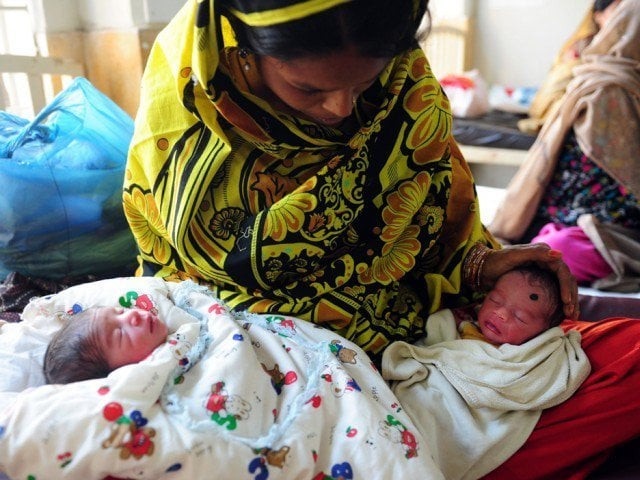Lack of policy: Maternal, neonatal deaths — a major issue in public hospitals
Key issues include a lack of equipment and shortage of staff

PHOTO: AFP
High incidents of maternal and neonatal deaths continue to be one of the major health issues in the country. Polyclinic, capital’s second largest hospital and located in its heart, has alone reported 34 maternal and 738 neonatal deaths during last five years, according to the documents available with The Express Tribune.
Documents further reveal that on average 1-3 women lose their life per month due to child-birth related complications in Pakistan Institute of Medical Sciences (Pims) – capital’s largest public hospital.
Polyclinic
A surge has been witnessed in the number of maternal deaths reported in Polyclinic from 2010-11 to 2014-15. According to the documents, the death toll climbed from 4 in 2010-11 to 7 in 2014-15, whereas in 2012-13 highest number of recorded deaths was 9.
Similarly, an increase has also been seen in the number of neonatal deaths reported during last five years. The death toll has increased from 97 in 2010-2011 to 119 reported cases in 2014-15. The highest number of reported cases was 201 in 2012-13.
Meanwhile talking to The Express Tribune, Dr Nosheen Farooq, associate surgeon and a senior gynaecologist at Polyclinic said that in general leading causes of maternal and neonatal deaths were postpartum haemorrhage, and eclampsia among others.
However, the major reasons behind these deaths specifically in Polyclinic were shortage of essential equipment like ventilators and beds in intensive care units and sometimes insufficient staff in labour rooms. “It becomes too difficult to save life of a mother or a new born that urgently needs a ventilator and the hospital does not have it. In this condition we completely feel helpless as we cannot even shift them to any other hospital,” Dr Farooq said.
She said these were the main hurdles in our way to reduce the number of maternal and neonatal deaths in the hospital. Without addressing these issues it is difficult to save dying mothers and babies, she said.
Pims
When contacted Shaheed Zulfiqar Ali Bhutto Medical University Vice-Chancellor Prof Javed Akram, he said that in Pims majority of women dying from child birth related complications are the ones being brought to the hospital in serious condition.
“They come from rural areas and due to lack of proper healthcare facilities or skilled birth attendants they suffer from severe complications and mostly die,” he said.
Meanwhile talking to The Express Tribune, an official of Ministry of National Health Services, Regulations and Coordination (NHSRC), who wished not to be named, said that currently Pakistan is considered as worst country in South Asia to be a mother in.
According to an annual Save the Children study, ‘State of the World’s Mothers: Saving Mothers and Children in Humanitarian Crises,’ launched in May 2014, Pakistan is ranked 147 out of 178 listed countries. Furthermore it is ranked dead last in South Asia in terms of child and maternal well-being, due to poor healthcare services, poverty, malnutrition and natural calamities.
The official said that besides the fact that the country receives hefty grants from international donor agencies for improving maternal and neonatal health and bringing down their death ratio, the issue is still unaddressed.
“I truly believe that saving a mother and a child in Pakistan does not require lots of money or constructing state of the art hospitals. All it needs is up-gradation of primary health care units in rural areas,” the official said.
There are many rural health care centres or basic health units which need to be made functional by equipping them with necessary medical equipment, medicines and trained staff, the official added.
“It will also help in reducing patient burden in tertiary care hospitals, which remain flooded with patients around the clock and face shortage of staff, beds and other equipment,” the official said.
Published in The Express Tribune, January 2nd, 2016.



















COMMENTS
Comments are moderated and generally will be posted if they are on-topic and not abusive.
For more information, please see our Comments FAQ